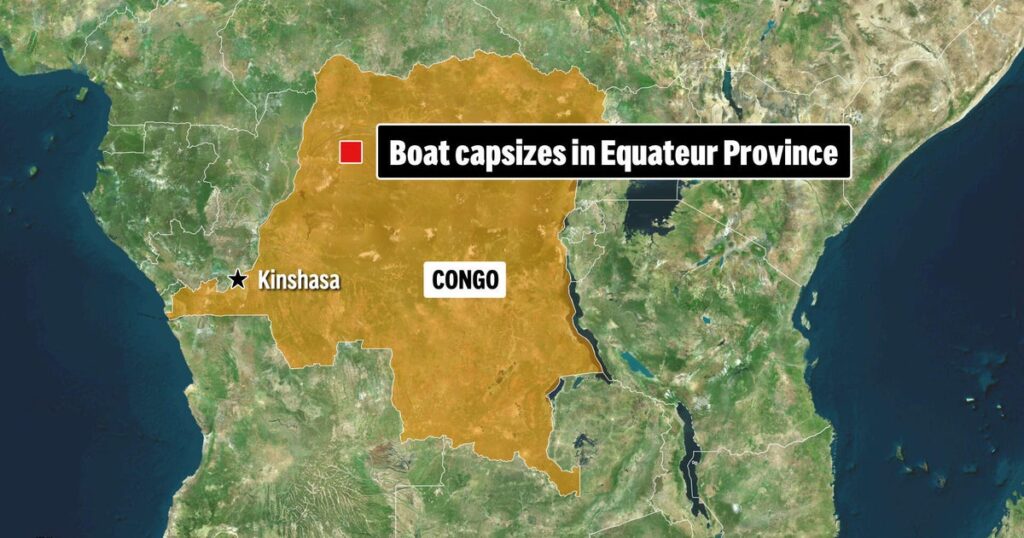In recent tragic events, two separate boat accidents in northwestern Congo have led to the confirmed deaths of at least 193 individuals, with many others reported missing. Officials detailed that these incidents took place just a day apart in Equateur province, highlighting a growing concern regarding maritime safety in the region. The precarious conditions of the vessels, exacerbated by poor management and nighttime travel, have raised alarms about ongoing safety issues on the Congo River.
| Article Subheadings |
|---|
| 1) Overview of the Incidents |
| 2) Details of the First Accident |
| 3) The Second Accident’s Impact |
| 4) Contributing Factors to the Accidents |
| 5) The Prevalence of Maritime Accidents |
Overview of the Incidents
The series of boat accidents has sparked widespread concern across the Congolese population and among humanitarian agencies. The first accident occurred on Wednesday, followed by another similar incident just a day later, reflecting systemic issues in the local transportation sector. Official reports indicate the involvement of hundreds of passengers, underscoring the scale of the tragedy.
Authorities and media outlets have confirmed that the incidents took place approximately 150 kilometers apart in the Equateur province. The frequency of these accidents raises pressing questions about safety regulations and enforcement in a region where many opt for water transport due to inadequate roads.
Details of the First Accident
On Thursday evening, a tragic event unfolded as a whaleboat carrying nearly 500 passengers capsized and caught fire along the Congo River in the Lukolela territory, part of the Equateur province. Reports from the humanitarian affairs ministry indicate that 209 survivors were rescued following the disaster, which left many families devastated and searching for their loved ones.
The boat was en route near the village of Malange when the accident occurred. Eyewitness accounts describe a chaotic scene where panic ensued among passengers, resulting in difficulties during evacuation procedures. The humanitarian ministry’s initial assessment underscores the need for urgent improvements in safety regulations for such vessels.
The Second Accident’s Impact
A day prior to the first accident, another boat capsized in the Basankusu territory, claiming the lives of at least 86 individuals, predominantly students who were traveling for educational purposes. State media reports indicate that several people remain missing, and searches for survivors were hampered by adverse conditions.
This incident further compounds the tragedy faced by the community and highlights the demographic at risk. Often, students and their families rely on boats for transportation, emphasizing the urgency of addressing this safety crisis. Reports did not disclose the specific number of missing persons, leading to increased anxiety among families waiting for news of their loved ones.
Contributing Factors to the Accidents
Initial investigations into the causes of these accidents have pointed to “improper loading and night navigation” as contributing factors. Local media sources attribute the Wednesday event to safety negligence on the part of the operators. During nighttime travel, visibility is severely compromised, making it challenging for boats to navigate the treacherous waters of the Congo River.
A civil society group has placed blame on government inaction regarding maritime safety and called for stricter regulations on boat operations. They argue that boats are frequently overloaded and lack adequate safety equipment like life jackets, which are often a rarity on these vessels. This lack of oversight raises questions about accountability and the need for improvements in transportation policies.
The Prevalence of Maritime Accidents
The occurrence of accidents on the Congo River is distressingly common. As the local road infrastructure deteriorates, more residents are compelled to travel by boat, often opting for cheaper, less reliable vessels that cannot sustain the heavy loads they carry. Such conditions lead to a cycle of danger, as these flimsy vessels are pushed beyond their limits.
Moreover, the overarching issue of poor navigational practices continues to endanger the lives of passengers. Reviews of maritime practices in the region indicate that many boats operate without the required safety measures, leading to frequent capsizing incidents that claim lives and leave families bereaved.
| No. | Key Points |
|---|---|
| 1 | Two separate boat accidents in Equateur province, Congo, resulted in at least 193 deaths. |
| 2 | The first incident involved a whaleboat that capsized due to overloading and caught fire. |
| 3 | The second accident involved a motorized boat targeting students, highlighting transportation risks. |
| 4 | Authorities attribute these accidents to improper loading and lack of safety protocols. |
| 5 | The rise in maritime accidents signals a critical need for improved transportation infrastructure and regulations. |
Summary
The recent boat accidents in Congo represent a significant public safety crisis, drawing attention to the broader issues affecting transportation in the region. With loss of life continuing to mount, it is imperative for authorities to reassess current regulations and implement necessary changes to enhance safety standards. The underlying causes of these tragedies must be thoroughly addressed to prevent similar incidents in the future.
Frequently Asked Questions
Question: What are the main causes of boat accidents in Congo?
The primary causes include improper loading of vessels, lack of safety equipment, and night navigation, which greatly increases the risk of capsize.
Question: How often do boat accidents occur in Congo?
Boat accidents along the Congo River have been increasingly frequent, especially as more people rely on water transport due to inadequate road networks.
Question: What actions are being suggested to improve maritime safety?
Civil society groups are advocating for stricter regulations concerning boat operations, better enforcement of safety standards, and improved infrastructure for safer alternatives.
